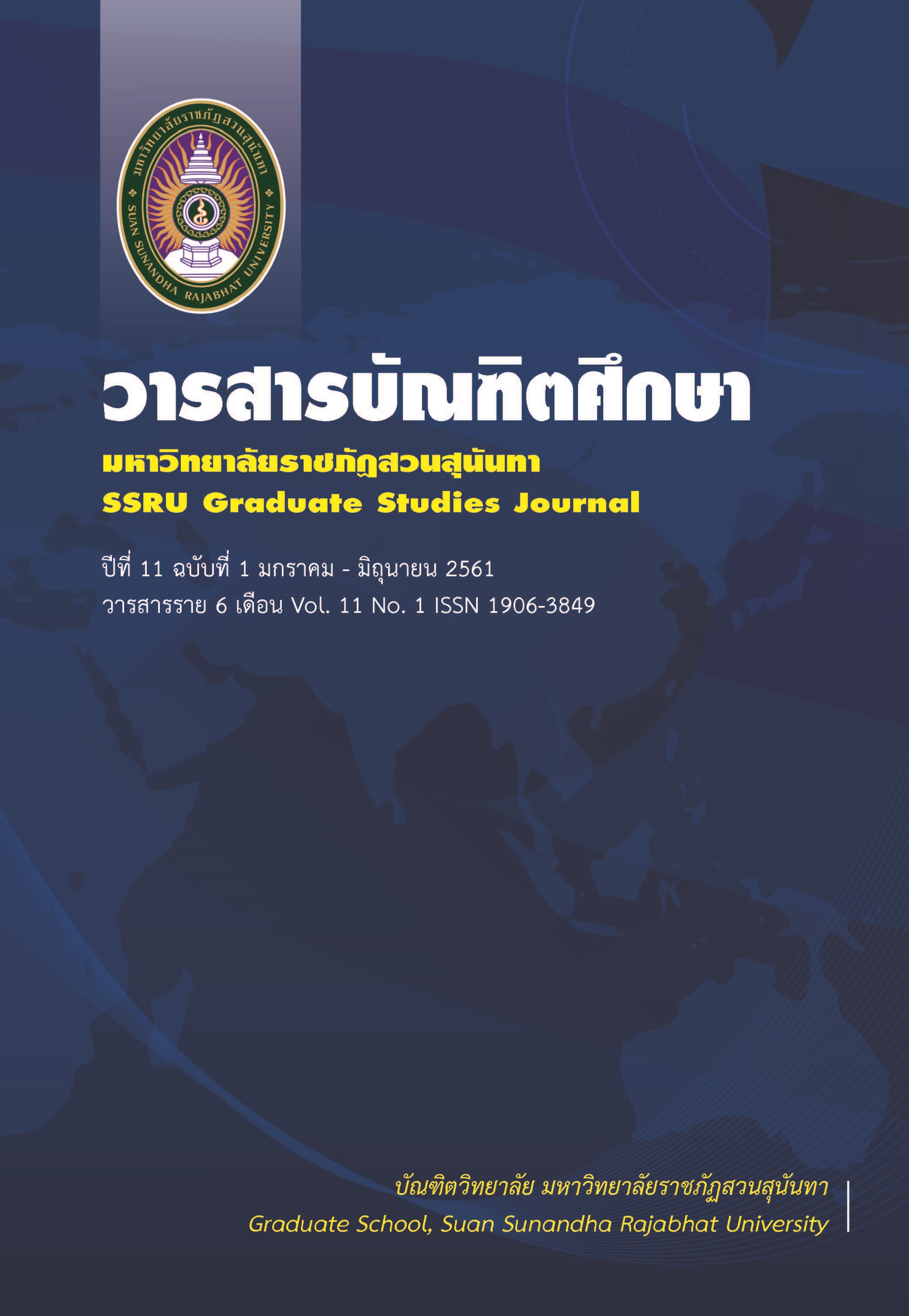ความสัมพันธ์ระหว่างความจงรักภักดีกับการคงอยู่ ของพนักงานธนาคารพาณิชย์ไทย
Main Article Content
บทคัดย่อ
การวิจัยนี้ศึกษาความสัมพันธ์ระหว่างความจงรักภักดีกับการคงอยู่ของพนักงานธนาคารพาณิชย์ไทย ใช้แบบสอบถามในการเก็บข้อมูลจากพนักงานของธนาคารพาณิชย์ไทย จำนวน 400 คน ด้วยวิธีสุ่มตัวอย่างแบบชั้นภูมิตามสัดส่วน วิเคราะห์ข้อมูลใช้สถิติเชิงพรรณนา เพื่อหาค่าเฉลี่ย ส่วนเบี่ยงเบนมาตรฐาน และสถิติเชิงอนุมานการวิเคราะห์ค่าความแปรปรวนทางเดียว (One-way ANOVA) และใช้การวิเคราะห์สมการถดถอยพหุคุณในการทดสอบความสัมพันธ์ของตัวแปร
ผลการวิจัยพบว่าผู้ตอบแบบสอบถามส่วนใหญ่เป็นเพศหญิง อายุระหว่าง 36 - 40 ปี มีรายได้รวมเฉลี่ยต่อเดือน 15,001 - 30,000 บาท การศึกษาระดับปริญญาโท สถานภาพสมรส ระดับเจ้าหน้าที่ มีอายุงานในงานปัจจุบันอยู่ในช่วง 2 - 4 ปี และอายุงานรวมกับการทำงานที่ธนาคารพาณิชย์อื่น ๆ 6 - 10 ปี ผลการวิจัยยังพบว่าปัจจัยแวดล้อมในการทำงาน ปัจจัยการสร้างแรงจูงใจ ปัจจัยการบริหารองค์กร ปัจจัยค่านิยมร่วมมีค่าเฉลี่ยอยู่ในระดับสูง เรียงตามลำดับ ส่วนเรื่องความจงรักภักดีด้านจิตใจ พบว่าพนักงานในองค์กรมีความเต็มใจทุ่มเทและอุทิศตนให้กับองค์กรเพื่อให้บรรลุเป้าหมายในระดับสูง มีความจงรักภักดีด้านบรรทัดฐาน พนักงานในองค์กรยอมทำตามความต้องการขององค์กรเพื่อให้ได้ผลตอบแทนในระดับสูง ด้านการคงอยู่พบว่าพนักงานมีความจงรักภักดีกับองค์กรอยู่ในระดับสูง ผลการทดสอบมีความสัมพันธ์ของตัวแปร พบว่า ปัจจัยส่วนบุคคลของพนักงานธนาคารพาณิชย์ไทยมีความสัมพันธ์กับการรับรู้เกี่ยวกับความภักดีในองค์กร ปัจจัยแวดล้อมในการทำงานมีผลต่อความภักดีในองค์กรด้านจิตใจและด้านบรรทัดฐาน ปัจจัยด้านการบริหารองค์กร มีอิทธิพลต่อความจงรักภักดีของพนักงาน ด้านจิตใจ และด้านบรรทัดฐาน ปัจจัยค่านิยมร่วมมีอิทธิพลต่อความจงรักภักดีของพนักงานด้านจิตใจและด้านบรรทัดฐาน ปัจจัยการสร้างแรงจูงใจของพนักงานมีอิทธิพลต่อความจงรักภักดีของพนักงาน ด้านจิตใจและด้านบรรทัดฐาน นอกจากนี้ผลการวิจัยพบว่าความผูกพันด้านจิตใจ และความผูกพันด้านบรรทัดฐาน มีความสัมพันธ์กับการคงอยู่ของพนักงานธนาคารพาณิชย์ไทยที่ระดับนัยสำคัญ 0.05
Article Details
เอกสารอ้างอิง
ขนิษฐา นิ่มแก้ว. (2554). ปัจจัยสภาพแวดล้อมในองค์กร ความผูกพันของบุคลากรในองค์กร: กรณีศึกษา สำนักบริหารโครงการกรมชลประธานสามเสน. ปริญญาบริหารธุรกิจมหาบัณฑิต มหาวิทยาลัยเทคโนโลยีราชมงคลธัญบุรี.
จุฑาธิป วีระมโนกุล. (2559). การศึกษาเรื่องแรงจูงใจ สภาพแวดล้อมในการทางานที่ส่งผลต่อความผูกพันต่อองค์กร: กรณีศึกษา บริษัท พี.วาย.ฟู้ดส์ จำกัด. การค้นคว้าอิสระบริหารธุรกิจมหาบัณฑิต มหาวิทยาลัยกรุงเทพ.
ณิชาศินี นำประดิษฐ. (2556). ปัจจัยจูงใจในการทำงานที่มีความสัมพันธ์กับความผูกพันต่อองค์กรธนาคารกรุงไทย จำกัด (มหาชน) จังหวัดราชบุรี. วิทยานิพนธ์บริหารธุรกิจมหาบัณฑิต บริหารธุรกิจ, มหาวิทยาลัยธนบุรี.
ธนาคารแห่งประเทศไทย. (2556). รายงานฐานะการเงินของธนาคารพาณิชย์ทั้งระบบ. จาก http:// www2.bot.or.th/statistics/ReportPage.aspx? reportID=154&language=th.
พิมพ์ชนก ทรายข้าว. (2553). ปัจจัยที่มีผลต่อความผูกพันต่อองค์กรของพนักงานธนาคารทิสโก้ จำกัด (มหาชน).
มธุรส วิไลลักษณ์. (2556). การศึกษาวัฒนธรรมองค์กร การทางานร่วมกันเป็นทีม และการติดต่อสื่อสารที่มีผลต่อความผูกพันของพนักงานระดับปฏิบัติการ กรณีศึกษา เขตบางพลี จังหวัด สมุทรปราการ. การค้นคว้าอิสระบริหารธุรกิจมหาบัณฑิต มหาวิทยาลัยกรุงเทพ.
วรรณวิไล ศรีปัญญาวิชญ์. (2552). ความผูกพันของพนักงานต่อองค์กร: กรณีศึกษาธนาคารทหารไทย จำกัด (มหาชน). รายงานการศึกษาค้นคว้าอิสระบริหารธุรกิจมหาบัณฑิต มหาวิทยาลัยสุโขทัยธรรมาธิราช.
ศิริพร ไทยกรณ์. (2554). ความผูกพันต่อองค์การของพนักงานธนาคารไทยพาณิชย์ จำกัด (มหาชน) ในเขตอำเภอเมือง จังหวัดเชียงใหม่. ปัญหาพิเศษบริหารธุรกิจมหาบัณฑิต บัณฑิตวิทยาลัย มหาวิทยาลัยแม่โจ้.
สรชัย พิศาลบุตร. (2550). การสร้างและประมวลผลข้อมูลจากแบบสอบถาม. กรุงเทพฯ: วิทยพัฒน์.
สานิตตา วงศ์สุรเศรษฐ์. (2552). ความผูกพันต่อองค์การของพนักงำนกสิกรไทย จำกัด (มหาชน) เขต 32เชียงใหม่. วิทยานิพนธ์บริหารธุรกิจมหาบัณฑิต มหาวิทยาลัยเชียงใหม่.
Allen, N., & Meyer, J. (1990). The measurement and antecedents of affective, continuance, and normative commitment to the organization. Journal of Occupational Psychology, 63, 1-18.
Becker, H. (1960). Notes on the Concept of Commitment. American Journal of Sociology, 66(1), 32-40.
Cronbach, L. J. (1951). Coefficient Alpha and the Internal Structure of Tests. Psychometrika, 16(3), 297-334.
Gilmer, B. von H. (1961). Psychological climates of organizations. In B. von Haller Gilmer (Ed.), Industrial psychology (2 nd ed., pp. 57-84). New York: McGraw-Hill.
Maslow, A. (1999). Toward a Psychology of Being. NJ: Wiley and Sons.
Meyer, J. P., Allen, N. J., & Smith, C. A. (1993). Commitment to organizations and occupations: Extension and test of a three-component model. Journal of Applied Psychology, 78, 538-551.
Moos, R. H. (1982). The Work Environment Scale manual. (2 nd ed.). Palo Alto, CA: Consulting Psychological Press.
Rokeach, M. (1973). The Nature of Human Values. New York: Free press.


